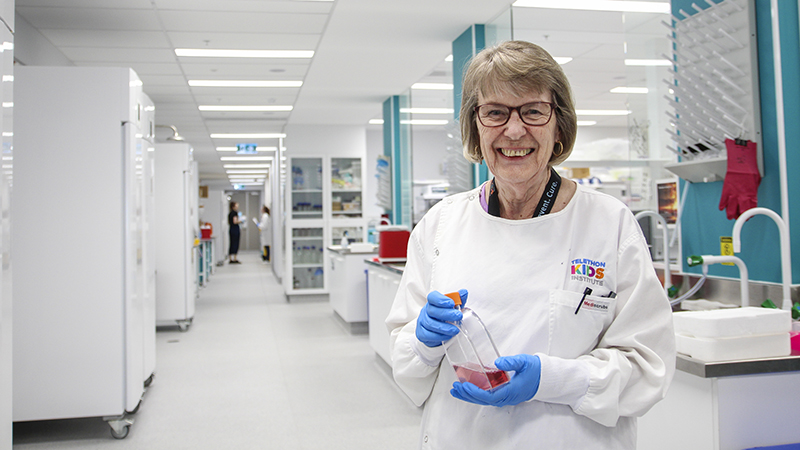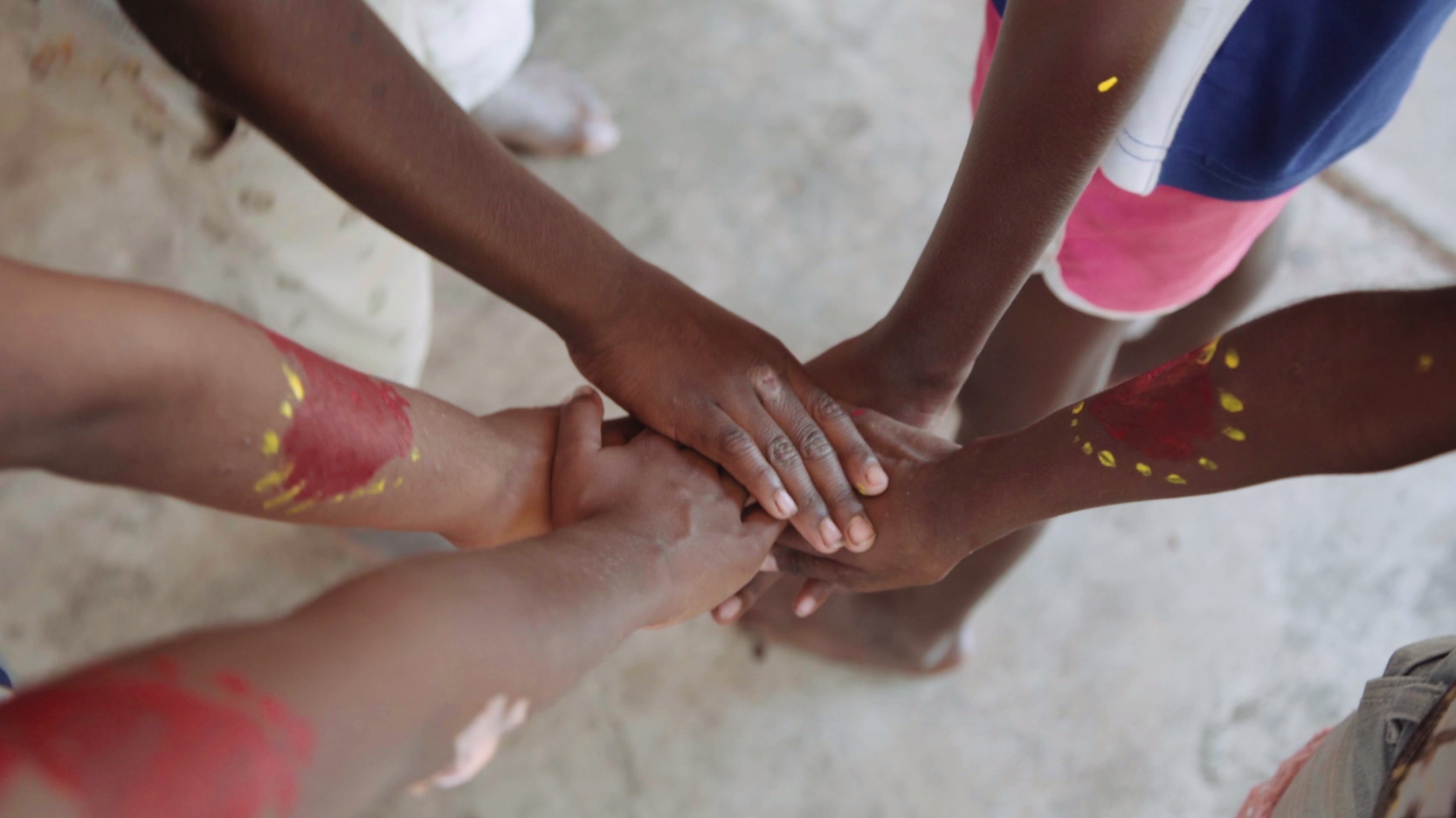Search
Research
Anaphylactic Reactions During Bee Venom Immunotherapy in the Paediatric PopulationA retrospective study will review episodes of anaphylaxis during bee venom immunotherapy in children, any modifications made to the dosing schedule, and the subsequent outcomes over a nine-year period in Western Australia.

News & Events
Global study finds human air travel culprit for RSV variant spreadGlobal circulation of respiratory syncytial virus (RSV) is shaped by human air travel with travellers hosting new strains fuelling transmission across borders, an international The Kids Research Institute Australia study found.

The Institute farewelled one of its most treasured employees this year, as The Kids Cancer Centre research officer Jette Ford closed the door on a quietly stellar 37-year career which has helped to change the face of cancer research in WA and around the world.

News & Events
The Kids Research Institute Australia activities at Telethon 2018As one of Telethon’s earliest and most long-standing beneficiaries, we are incredibly proud to be taking part in the Telethon Weekend again in 2018.
Research
Prioritizing high-risk populations for soil-transmitted helminth control in the Western Pacific RegionTo achieve targets set within the 2030 Sustainable Development Agenda and the 2021–2030 Neglected Tropical Diseases (NTD) Roadmap, the World Health Organization identify the need for improved data analytics to inform NTD control programs.
Research
Impact of pediatric anesthesia management on cancer outcomes in children—a narrative reviewThe relationship between anesthetic technique and pediatric oncological outcomes is an emerging field of interest. With significant improvements in childhood cancer survival in recent decades, there is an increased focus on optimizing the quality of survival and reducing the incidence of metastasis and recurrence. The aim of this narrative review article is to investigate and consolidate the current available evidence assessing the immunomodulatory effects of anesthesia in the pediatric oncology population.
Research
Collecting behavioural data across countries during pandemics: Development of the COVID-19 Risk Assessment ToolTools that can be used to collect behavioural data during pandemics are needed to inform policy and practice. The objective of this project was to develop the Your COVID-19 Risk tool in response to the global spread of COVID-19, aiming to promote health behaviour change. We developed an online resource based on key behavioural evidence-based risk factors related to contracting and spreading COVID-19. This tool allows for assessing risk and provides instant support to protect individuals from infection.
Research
Missed Opportunities for Diagnosing Acute Rheumatic FeverWe have read with interest the new publication by Rouhiainen and colleagues on missed opportunities for preventing or diagnosing acute rheumatic fever (ARF).

News & Events
The Kids Research Institute Australia research teams supported by WA Near-Miss AwardsSeven important The Kids Research Institute Australia research projects have received support from the Future Health Research and Innovation Fund through the WA Near-Miss Awards (WANMA).
Research
Development and Validation of a Stability-Indicating RP-HPLC Method for Edaravone QuantificationEdaravone is used to treat motor neurone disease (MND) by slowing disease progression and prolonging survival time. Currently, it is available as an IV infusion (Radicava®, Jersey City, NJ, USA) and an oral liquid suspension (Radicava ORS®, Jersey City, NJ, USA). Development of novel edaravone formulations is still an active field of research that requires a validated stability-indicating assay capable of providing specific, precise, and accurate quantification of edaravone content.
Research
TransgenderTransgender is a term that includes people whose gender identity, gender expression, or behavior does not conform to conventional gender notions of male or female.
Research
Rett Syndrome Behaviour Questionnaire: Variability of Scores and Related FactorsRett syndrome (RTT) is a severe neurodevelopmental disorder affecting predominantly females and associated with variants in the MECP2 gene. Recent success in clinical trials have resulted in an expanded use of the Rett Syndrome Behaviour Questionnaire (RSBQ) for clinical and research purposes.
Research
#TransTok: a digital ethnographic study using content analysis to investigate transgender and gender diverse ‘for you page’ content on TikTok that may affect mental healthTransgender and gender diverse (“trans”) people are more likely to experience adverse mental health outcomes due to the social adversities that are commonly experienced. One ameliorating factor for poor mental health outcomes can be connection to community, often facilitated in online spaces such as TikTok.

News & Events
RSV prevention finally in reach after 20 years of research at The Kids Research Institute AustraliaWorld-first immunisations providing protection against deadly respiratory syncytial virus (RSV) could be just months away thanks to global research efforts spanning multiple decades.

News & Events
Community-led research set to revolutionise treatment of rheumatic heart diseaseYoung Aboriginal and Torres Strait Islander people receiving long-term, painful injections to prevent deadly complications from rheumatic heart disease (RHD) will design their own optimum treatment program thanks to latest research at The Kids Research Institute Australia.
Research
The Changing Detection Rate of Respiratory Syncytial Virus in Adults in Western Australia between 2017 and 2023The incidence of respiratory syncytial virus (RSV) in adults is inadequately defined and the impact of SARS-CoV-2-related non-pharmaceutical interventions (NPIs) is underexplored. Using laboratory data, we described the detection rate of RSV in adults ≥16 years in Western Australia (WA) between 2017 and 2023.
Research
Invasive fungal disease in children with acute myeloid leukaemia: An Australian multicentre 10-year reviewInvasive fungal disease (IFD) is a common and important complication in children with acute myeloid leukaemia (AML). We describe the epidemiology of IFD in a large multicentre cohort of children with AML.
Research
Invasive fungal disease and antifungal prophylaxis in children with acute leukaemia: a multicentre retrospective Australian cohort studyInvasive fungal disease is a common and important complication in children with acute myeloid leukaemia (AML). We describe the epidemiology of IFD in a large multicentre cohort of children with AML.

News & Events
Researchers call for more oxygen machines in PNG to curb pneumonia deathsA study by The Kids Research Institute emphasizes the need to measure oxygen levels in children with pneumonia, revealing that symptoms alone may miss critical hypoxia cases.
Research
Novel coenzyme Q6 genetic variant increases susceptibility to pneumococcal diseaseAcute lower respiratory tract infection (ALRI) remains a major worldwide cause of childhood mortality, compelling innovation in prevention and treatment. Children in Papua New Guinea (PNG) experience profound morbidity from ALRI caused by Streptococcus pneumoniae. As a result of evolutionary divergence, the human PNG population exhibits profound genetic variation and diversity. To address unmet health needs of children in PNG, we tested whether genetic variants increased ALRI morbidity.
